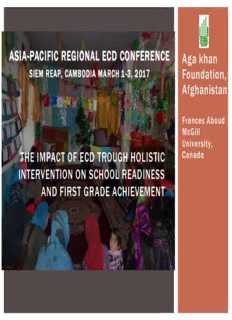
Mr. Abdul Wakil Aga Khan Foundation, Afghanistan The impact of investing in ECD Afghanistan PDF
Preview Mr. Abdul Wakil Aga Khan Foundation, Afghanistan The impact of investing in ECD Afghanistan
ASIA-PACIFIC REGIONAL ECD CONFERENCE Aga khan Foundation, SIEM REAP, CAMBODIA MARCH 1-3, 2017 Afghanistan Frances Aboud McGill University, THE IMPACT OF ECD TROUGH HOLISTIC Canada INTERVENTION ON SCHOOL READINESS AND FIRST GRADE ACHIEVEMENT AGA KHAN FOUNDATION, AFGHANISTAN Presented by Abdul Wakil, Nation Advisor, Education AKF Afghanistan Aga Khan Foundation, Afghanistan An agency of the Aga Khan Development Network www.akdn.org STRUCTURE AND PURPOSE OF PRESENTATION Structure: Context & background of ECD Programme; where and how we work and the result of school readiness and grade one achievement study. Purpose: The impact of ECD Trough holistic intervention on school readiness and first grade achievement CONTEXT & BACKGROUND TO EARLY CHILDHOOD DEVELOPMENT Currently 1% of Afghan children access preschools ECE Department established at the ministry of Education in 2010 Many preschools established in all provinces by NGOs and private sectors ECD policy developed and approved in Oct-2015 The following NGOs supported the MoE on the ECD policy development. AKF, UNICEF, CARE, CRS, IRC, PARSA, SC ECE working group Established in 2011 at the ministry of education Aga Khan Foundation and Save The Children developed preschool curriculum for the government which is under process of approval MULTI-INPUT APPROACH IN AGA KHAN FOUNDATION, AFGHANISTAN Education ECD Natural Health Resource Management THE IMPACT OF ECD TROUGH HOLISTIC INTERVENTION ON SCHOOL READINESS AND FIRST GRADE ACHIEVEMENT School Readiness Skills and Grade one Achievement Studies result Frances Aboud McGill University, Canada THE STUDY: RESEARCH QUESTIONS 1. Does preschool make a difference in children’s school readiness competencies? 2. Does preschool make a difference in children’s literacy and math achievement in grade one? 3. Do parenting sessions make a difference in parent’s engagement with their children’s development? LOCATION OF STUDY PARTICIPANTS Bamyan • 55.7% poverty rate • 79.4% agrarian • Mainly rural Baghan • 17.5% adult • 18% poverty females are rate literate* • 69.4% agrarian • Mainly rural • 12.9% adult females are literate*
Description: